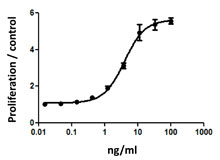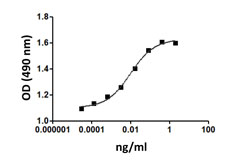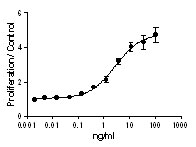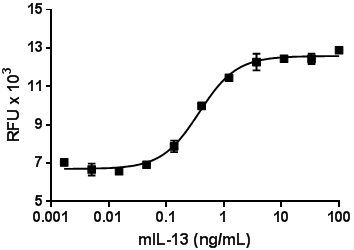- Regulatory Status
- RUO
- Other Names
- Interferon-γ, Immune interferon, Type II interferon, T cell interferon, Macrophage-activating factor (MAF)
- Ave. Rating
- Submit a Review
- Product Citations
- 6 publications
| Cat # | Size | Price | Quantity Check Availability | Save | ||
|---|---|---|---|---|---|---|
| 714006 | 100 µg | £174 | ||||
This product is not available for shipping outside of the United States.
Interferon-γ is a potent multifunctional cytokine which is secreted primarily by activated NK cells and T cells. Originally characterized based on anti-viral activities, IFN-γ also exerts anti-proliferative, immunoregulatory, and proinflammatory activities. IFN-γ can upregulate MHC class I and II expression by antigen presenting cells.
Product DetailsProduct Details
- Source
- Mouse IFN-γ, amino acids His23-Cys155 (Accession # NM_008337), was expressed in E. coli.
- Molecular Mass
- The 134 amino acid N-terminal methionylated recombinant protein has a predicted molecular mass of 15.7 kD. The predicted N-terminal amino acid is Met.
- Purity
- >98%, as determined by Coomassie stained SDS-PAGE and HPLC analysis.
- Formulation
- Lyophilized, carrier-free.
- Endotoxin Level
- Less than 0.1 ng per µg of protein.
- Storage & Handling
- Unopened vial can be stored at -20°C or -70°C. For maximum results, quick spin vial prior to opening. Reconstitute in water to a concentration of 1.0 mg/ml. Do not vortex. It is recommended to further dilute in a buffer, such as 5% Trehalose, and store working aliquots at -20°C to -80°C. Avoid repeated freeze/thaw cycles.
- Activity
- ED50 is ≤ 0.2 ng/mL, corresponding to a specific activity ≥ 5 x 106 units/mg as determined by its ability to inhibit the proliferation of murine WEHI-279 cells.
- Application
-
Bioassay
- Product Citations
-
Antigen Details
- Structure
- Cytokine
- Distribution
-
CD8+ and CD4+ T cells, NK cells.
- Function
- Upregulated by IL-2, FGF-basic, EGF; downregulated by vitamin D3 or DMN; labile at pH2.
- Interaction
- T cells, B cells, macrophages, NK cells, endothelial cells, fibroblasts.
- Ligand/Receptor
- IFN-γRα (CDw119) dimerized with IFN-γRβ (AF-1).
- Bioactivity
- Antiviral/antiparasitic activities; inhibits proliferation; enhances MHC class I and II expression on antigen presenting cells.
- Cell Type
- Embryonic Stem Cells
- Biology Area
- Cell Biology, Immunology, Neuroinflammation, Neuroscience, Stem Cells
- Molecular Family
- Cytokines/Chemokines
- Antigen References
-
1. Reynolds DS, et al. 1987. J. Immunol. 139:767.
2. Dey S, et al. 2010. Mol. Cell. Biol. 30:2181.
3. Sun T, et al. 2012. Proc. Natl. Acad. Sci. USA 109:E2117. - Gene ID
- 15978 View all products for this Gene ID
- UniProt
- View information about IFN-gamma on UniProt.org
Related FAQs
- Why choose BioLegend recombinant proteins?
-
• Each lot of product is quality-tested for bioactivity as indicated on the data sheet.
• Greater than 95% Purity or higher, tested on every lot of product.
• 100% Satisfaction Guarantee for quality performance, stability, and consistency.
• Ready-to-use liquid format saves time and reduces challenges associated with reconstitution.
• Bulk and customization available. Contact us.
• Learn more about our Recombinant Proteins. - How does the activity of your recombinant proteins compare to competitors?
-
We quality control each and every lot of recombinant protein. Not only do we check its bioactivity, but we also compare it against other commercially available recombinant proteins. We make sure each recombinant protein’s activity is at least as good as or better than the competition’s. In order to provide you with the best possible product, we ensure that our testing process is rigorous and thorough. If you’re curious and eager to make the switch to BioLegend recombinants, contact your sales representative today!
- What is the specific activity or ED50 of my recombinant protein?
-
The specific activity range of the protein is indicated on the product datasheets. Because the exact activity values on a per unit basis can largely fluctuate depending on a number of factors, including the nature of the assay, cell density, age of cells/passage number, culture media used, and end user technique, the specific activity is best defined as a range and we guarantee the specific activity of all our lots will be within the range indicated on the datasheet. Please note this only applies to recombinants labeled for use in bioassays. ELISA standard recombinant proteins are not recommended for bioassay usage as they are not tested for these applications.
- Have your recombinants been tested for stability?
-
Our testing shows that the recombinant proteins are able to withstand room temperature for a week without losing activity. In addition the recombinant proteins were also found to withstand four cycles of freeze and thaw without losing activity.
- Does specific activity of a recombinant protein vary between lots?
-
Specific activity will vary for each lot and for the type of experiment that is done to validate it, but all passed lots will have activity within the established ED50 range for the product and we guarantee that our products will have lot-to-lot consistency. Please conduct an experiment-specific validation to find the optimal ED50 for your system.
- How do you convert activity as an ED50 in ng/ml to a specific activity in Units/mg?
-
Use formula Specific activity (Units/mg) = 10^6/ ED50 (ng/mL)

 Login / Register
Login / Register 
















Follow Us